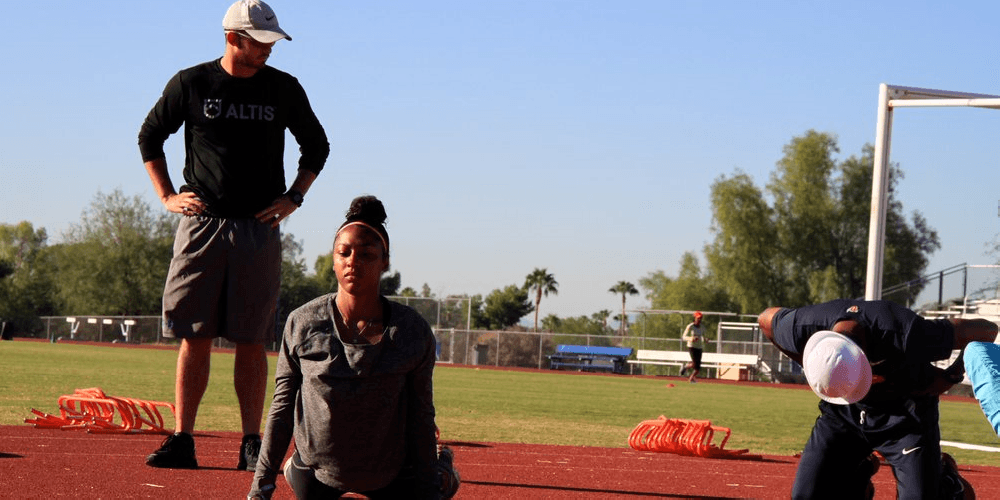Have you ever wondered what it’s like to work for ALTIS? Well, the guesswork is over! This week’s blog-post by ALTIS Strength & Power Coach – Jason Hettler reveals a behind the scenes insight into his working environment on a daily basis.
A recent visitor to one of our practices posed the following question to me: “What is your favorite part about working for ALTIS?” After roughly twenty seconds of silently staring into the blue Phoenix sky we both began to chuckle. He knew as much as I did how difficult a question this was to answer – and he could clearly see it on account of my blank expression. I explained to him that a multitude of answers had raced through my head in those twenty seconds; and that rather than trying to settle on one I would give him three. So without further ado, and in no particular order, the below is a triad of thoughts on what makes ALTIS so special as a place to work …
Open-Door Policy
At ALTIS we pride ourselves on operating with an open approach to sharing all we do. This is not by chance, but represents a deliberate and concerted attempt to improve our sport at all levels, across multiple disciplines. As a young coach, working within an environment whose staff wholeheartedly embrace this philosophy has been instrumental to my development.
The knowledge that emanates and circulates amongst our staff is – in my opinion – priceless. On any given day you can walk around our facilities and stumble upon conversations and discussions between athletes, coaches, and therapists. Many of the conversations that I’ve serendipitously found myself listening into have rivaled the content of any formal lecture or conference I’ve attended. Couple this with the insights and information that come in through the steady flow of visiting coaches who join us onsite – on a seemingly weekly basis, and I have been granted access to a vast network of colleagues and resources that span the globe. Having the opportunity to engage in real-life, real-time conversations with these successful coaches – stemming from a multitude of backgrounds makes for an ideal learning environment.
That being said, the open-door policy is only one of the many aspects of ALTIS which makes it tantamount to the Olympic Games of learning environments. Standing atop the podium you will find…
Athlete Contact Hours
Being a coach at ALTIS means just that – you coach. A LOT. Between the track and the weight room I spend 5-6 hours a day, 6 days a week practicing my chosen profession. Whilst there is of course much to be learned from those who came before me, the real learning comes from personal, practical experiences – and the subsequent reflection that takes place following those experiences. The way I see it is as follows: Your experiences are your bricks, and reflection is your mortar. Reflection is what allows you to construct a structure from your experiences – it allows you to make your experiences stick.
In her article ‘Transforming Teaching Practice’ Barbara Larrivee wrote: “Experience is not pure – everything is contextually bound.” Reflection allows you to make sense of the experience within the context. It helps you to organize the experience and transform it into knowledge – this is a concept I wholeheartedly agree with: After a couple months into my first season with what was at the time the World Athletics Center I realized that I had been so overwhelmed with everything around me that I had not taken the time to sit down, take a deep breath, and reflect. At this time, I thought back to many of the training sessions I had coached, and I was able to pinpoint a few positive coaching experiences and a few times when I should have done better. I remembered one particular instance from early in the season when I was working on Olympic lifting technique with an athlete; there was not much progress made in that session and I was bothered by it. It wasn’t until a few weeks later during my time of reflection when I thought back to that session as well as previous lectures and discussions that I realized the mistakes I made. I got stuck on one cue rather than being creative and finding one that worked with that individual athlete. I also flooded the athlete with too much information at one time.
In his book ‘Mastery’ Robert Greene warns: “We spend too much time entangled in emotional issues, and we never quite have enough detachment to reflect and learn from our experiences.” Had I not taken the time to reflect on this situation I would have never drawn an accurate conclusion on what happened and would have missed a great opportunity to grow as a coach. From that point forward I have made a conscious effort to reflect much more frequently. Oftentimes these are very brief conversations in my head at the end of the day where I ask myself: “What went well and what did not?” I also conduct a more formal, written reflection every few months. These reflections have been highly educational and are a formative practice that I truly enjoy.
The Athletes
Track & Field is all about the athletes. At ALTIS we are in a very fortunate position as our Recruitment Director – Andreas Behm – has done a phenomenal job of bringing in athletes who fit extremely well with our ethos.
Whilst people oftentimes assume professional athletes may come with sizable egos, I take great pride in putting people straight on this within the context of the environment we work in: There are in fact no egos within our training group, and everyone here gets along exceptionally well. The coaches and athletes at ALTIS are all in it for one reason; to be the best they can be while progressing the sport. This leaves no room for egos.
In addition to great personalities, the athletes here also have an insatiable thirst for knowledge. They do a great job of asking questions and inquiring about why we do what we do: They attend optional lectures and discussions, and they strive to develop a PhD level understanding of their respective events.
For me, there are two key take-aways from this: First, it tells me that ALTIS athletes are intrinsically motivated – they are not driven solely by fame and fortune – they simply want to be better. Secondly, it tells me that I better be prepared to field questions on a daily basis; this means I need to ensure I have a very sound understanding of the underpinning principles behind why we do what we do for all elements of our training programs. For example, when I can eloquently and concisely explain to an athlete why we are doing a warm-up in the weight-room despite coming straight from the track, it allows me to get much more buy-in. This immediately reduces resistance from athletes who are itching to get into their gym workout at the expense of a proper warm-up.
When on the topic of the athletes at ALTIS, I would be remiss not to mention their high level of performance. I find myself in awe on a daily basis of the physical feats these men and women are able to perform; from the speeds they reach on the track, to the loads they move in the weight room – their physical abilities are astounding. It makes my job as a coach very enjoyable.
I hope this blog-post was able to shine some light on my current situation as the Strength & Power Coach at ALTIS. I believe something very special is going on here, and simply wanted to share that through the eyes of a young coach who has been fortunate enough to find himself in the middle of it all.
Jason

